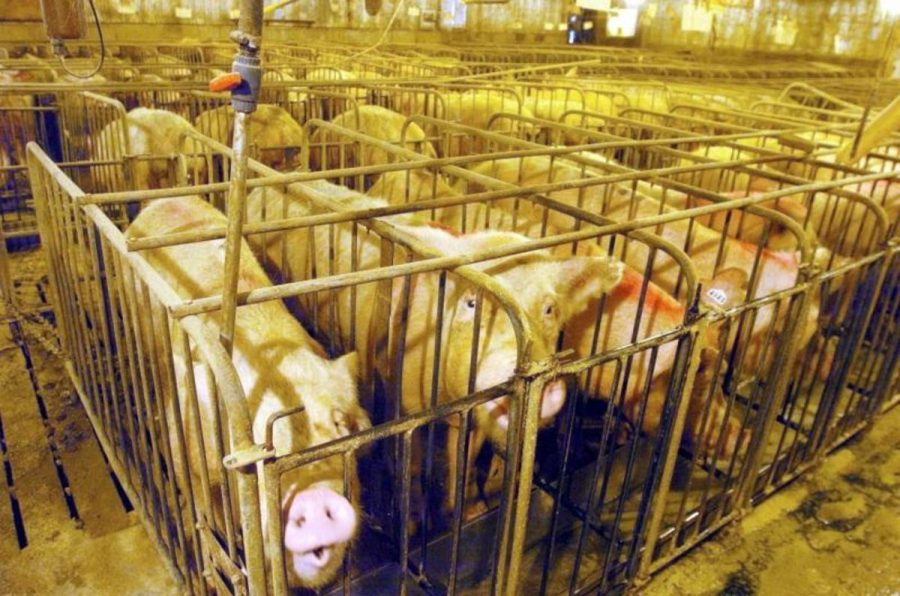Stopping cruelty of efficiency
Pigs are held in cages where they cannot even turn around, let alone turn their head. Pigs are smart enough that they can actually be driven insane by this treatment, often screeching and writhing within their cages. They are often fed special meals that can make them bloated are and designed to make them grow larger than normal.
February 26, 2015
Animal cruelty. It is a topic that has been beaten to death. Literally. The worse treatment of animals is not that of pets, but that of farm animals, which are not protected by abuse laws.
It is called Factory Farming, where animals are treated more like machines and objects. Crammed into small spaces filled with bacteria and their own excrement, the only thing they have to look forward to is deaths sweet release.
“I am not going to do anything differently. I feel bad, yeah; it’s that I just don’t see it happening. All I see is a delicious hamburger, not a drugged up cow,” freshman Modesto Dominguez said.
This is the problem; the majority of the populace does not see what happens to get that steak on their plate or how that hamburger came to be.
Americans are often meat-eaters like me; thousands of Americans seem too waved off the idea of factory farming and genetically manipulated of farm animals.
Why? Because the majority of people have never seen what the animals go through, do not know their pain, and it feels far away. That is until people started to dig deeper, and what is found is disgusting and horrible.
There is a particular video, called “Glass Walls.” It is the concept that if slaughterhouses had glass walls, everyone would be a vegetarian.
The video is not for the faint of heart. It is brutal in showing every detail of the gore and shrieks of the animals’ death and how they are ‘farmed.’ I felt unsettled, disturbed by the sights.
Pigs are smart, if not smarter than most dogs and small children. They have cognitive abilities and know what is happening around them, able to feel pain like any human.
The method of killing older pigs is to send an electrical shock to their head before their throats are cut, but the common occurrence is that the shock does not completely stun them.
The saddest thing is that the one time any of the pigs would feel the sun would be when they are shipped off in crowded trucks for slaughter.
This is but one type of treatment of one factory farmed animal, and only a few details of the pain felt. Cows, turkeys, chickens and especially fish are some other animals that are not protected by animal abuse laws.
They are all cultivated and genetically enhanced to give more meat and flesh for human consumption.
“It feeds a lot of people when you modify and inject the animals with steroids. How can we know what’s exactly in the food? All I know is it tastes good. We shouldn’t be eating it, but it’s everywhere and cheap,” senior Nick Johnson said.
Fish can feel pain like humans and have personalities, to a majority of people’s surprise. Yet, they are treated worse than even factory farm animals.
The methods used on fish would be illegal on any other species because of how damaging and harsh they are.
Scientists suspect that by 2048, there will no longer be fish in the oceans if farmers continue to over-fished. Fish that are raised in aquaculture, or underwater factory farming, have it even worse.
They live their lives in toxic water comprised of their own fecal matter and disease. In several farms, over 40% die in these waters before they are ready to be killed and packaged.
Factory farming and genetically modified animals is a topic that can be described for days with horrible breeding to form chickens that cannot stand on their own legs because of their weight and rods stabbed into sows’ brains to inhibit special hormones to produce more piglets.
Factory farming is not just about how the animals are treated; it affects us, humans, in a hundred different ways.
Large-scale commercial livestock and poultry operations produce an estimated 500 million tons of manure each year, more than three times the sewage produced by the entire U.S. human population.
Most of that 500 million tons of manure are untreated and dumped into lakes and spread on farm land in such large amounts that the soil cannot absorb it, so it leaks into the environment and waterways.
Not to mention the disease and sickness that rides within this literal wave of crap. It goes into our waterways, kills the fish, and comes to us.
The meat in that cheese burger we so often love is filled with E. coli and other diseases because of how the animals are packed so close together, bacteria soaking into their hides as they are forced to live in piles of their own excrement.
“It won’t make me stop eating meat. Maybe if I actually see it happen, then it might affect me. But food is food. As long as it fills me up, I’m good,” senior Glenn Heghes said.
The milk people crave causes cows to be kept in a state of pregnancy for months so they can continue to produce milk painfully in cramped spaces, via hormonal tampering by people.
The cruelty that farmed animals face just to make it cheaper for humans to buy meat is an unspeakable crime that needs to be resolved. Conditions need to be improved and factory farming halted.







